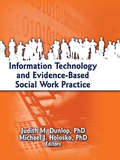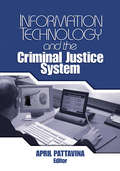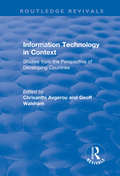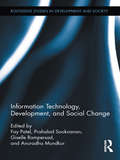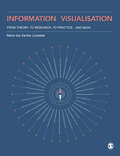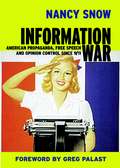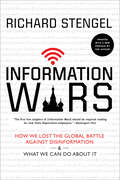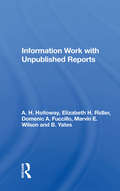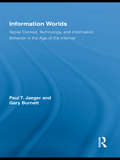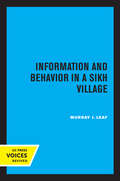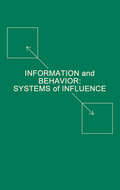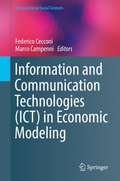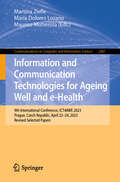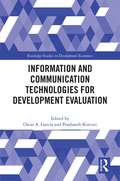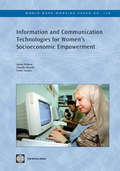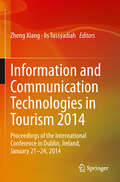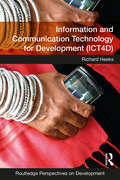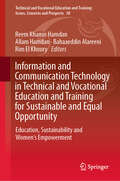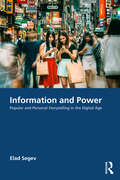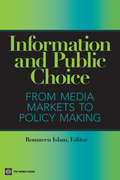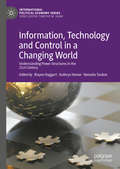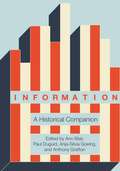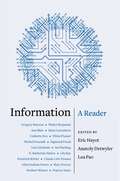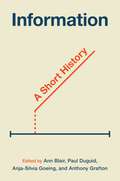- Table View
- List View
Information Technology and Evidence-Based Social Work Practice
by Michael J. Holosko Judith M. DunlopLearn to use the latest technological advances in evidence-based social workSocial work practice can be positively or negatively impacted by the advance of technology. Advances and applications must be up-to-date as possible, yet they may be ineffective if not simple enough to easily learn and use. Information Technology and Evidence-Based Social Work presents leading social work experts exploring the latest technological advances and the innovative practical applications which can be used effectively in evidence-based social work. Students and practitioners get creative practical advice on how best understand technology and apply it to their work.Information Technology and Evidence-Based Social Work is divided into four sections. The first section provides the context for understanding the technological link between social work and evidence-based practice. The second section presents examples of how information technology can be used to effectively teach students and practitioners in the field. Section three explores ways to implement technology for use by clients. The fourth section summarizes and then takes a look at the future of technology in evidence-based social work. Chapters include questions for practitioners and for clients to illuminate the current and future issues surrounding technology and evidence-based practice. The text also includes extensive references, and useful tables and figures.Topics in Information Technology and Evidence-Based Social Work include: the impact of technology on social work computer-assisted evidence-based practice customized web-based technology and its use in clinical supervision enhanced technology-based evidence-based practice model and its applicability to large human service organizations. using information technology to provide evidence for planning and evaluating programs using technology in advocacy the geographic information system (GIS) as a useful tool in all aspects of programs and policies evaluating practice through information technology the development and evaluation of an online social work service psychotherapeutic group intervention for family caregivers over the Internet support group online chat a case study of how Internet chat group technology can be implemented with cancer survivors technology as a service learning mechanism for promoting positive youth development in a community-based setting a model which can be used to collect information and—by using best evidence available—arrive at a confident decision and more! Information Technology and Evidence-Based Social Work is timely, stimulating reading for educators, undergraduate students, graduate students, and practitioners in the fields of social work, psychology, and public administration.
Information Technology and the Criminal Justice System
by Dr April PattavinaInformation Technology and the Criminal Justice System suggests that information technology in criminal justice will continue to challenge us to think about how we turn information into knowledge, who can use that knowledge, and for what purposes. In this text, editor April Pattavina synthesizes the growing body of research in information technology and criminal justice. Contributors examine what has been learned from past experiences, what the current state of IT is in various components of the criminal justice system, and what challenges lie ahead.
Information Technology in Context: Studies from the Perspective of Developing Countries (Routledge Revivals)
by Chrisanthi Avgerou Geoff WalshamThis title was first published in 2000. A discussion of information technology (IT) in developing countries. The contributors can be considered to share the following set of broad premises: information and communication technologies, and related systems, have significant potential to aid the economic growth and improvement of social conditions in the developing world; however, such potential is not released by simply transferring technologies and processes from advanced economies; in order to better serve development needs, people involved with the design, implementation and management of IT-related projects and systems in developing countries must improve their capacity to address the specific contextual characteristics of the organization, sector, country or region within which their work is located. The text thus emphasizes the importance of context in examining the role and value of IT in the developing countries. It focuses attention on the fusion of the activities of "professionals" (technical experts, managers, policy makers) and "users" (more broadly, all other groups affecting or affected by the technologies and systems), with the intention of facilitating locally meaningful and effective change.
Information Technology, Development, and Social Change (Routledge Studies in Development and Society)
by Fay Patel Prahalad Sooknanan Giselle Rampersad Anuradha MundkurThe speed and cost effectiveness of new information technology has prompted many to view these innovations as a panacea for social and economic development. However, such a view flies in the face of continuing inequities in education, health, food, and infrastructure. This volume explores these issues – along with questions of access, privilege, literacy, training, and the environmental and health effects of information technologies in the developing world – arguing that a higher level of development does not always result from a higher level of technologization.
Information Visualisation: From Theory, To Research, To Practice and Back
by Maria dos Santos LonsdaleIn a world of information overload, this book will help you to cut through the noise and communicate information with clear, efficient, and engaging visualisations. Taking you on a journey through a full range of different types of visualisations including infographics and motion graphics, the book: • Explains the underlying principles behind information visualisation, including the science of visual perception and cognition • Provides easy-to-digest guidelines that bring research and best practice together • Showcases a range of real-world applied examples, and outlines the do’s and don’ts of different approaches • Shows how to use research methods to design with and for your target audience. From an expert with years of experience researching, teaching, and doing information visualisation, learn how to make better and informed decisions around visualisation design that are appropriate for both your data and audience.
Information Visualisation: From Theory, To Research, To Practice and Back
by Maria dos Santos LonsdaleIn a world of information overload, this book will help you to cut through the noise and communicate information with clear, efficient, and engaging visualisations. Taking you on a journey through a full range of different types of visualisations including infographics and motion graphics, the book: • Explains the underlying principles behind information visualisation, including the science of visual perception and cognition • Provides easy-to-digest guidelines that bring research and best practice together • Showcases a range of real-world applied examples, and outlines the do’s and don’ts of different approaches • Shows how to use research methods to design with and for your target audience. From an expert with years of experience researching, teaching, and doing information visualisation, learn how to make better and informed decisions around visualisation design that are appropriate for both your data and audience.
Information War: American Propaganda, Free Speech and Opinion Control Since 9-11 (Open Media Series)
by Greg Palast Nancy SnowIn Information War, former United States Information Agency employee Nancy Snow describes how U.S. propaganda efforts and covert operations are expanding more rapidly today than at any other time in U.S. history, as the Bush administration attempts to increase U.S. dominance by curbing dissent and controlling opinion. Snow lays out the propaganda techniques that the government uses to control dissent in the twenty-first century, spotlights the key players and their spinmeistering abilities in the information war, and describes memorable "leaks" in the Administration's efforts to conduct stealth propaganda programs and control information at home. Ultimately she shows that dissent and true democracy are the early casualties of these policies.
Information Wars: How We Lost the Global Battle Against Disinformation & What We Can Do About It
by Richard StengelA “well-told” insider account of the State Department’s twenty-first-century struggle to defend America against malicious propaganda and disinformation (The Washington Post).Disinformation is nothing new. When Satan told Eve nothing would happen if she bit the apple, that was disinformation. But today, social media has made disinformation even more pervasive and pernicious. In a disturbing turn of events, authoritarian governments are increasingly using it to create their own false narratives, and democracies are proving not to be very good at fighting it.During the final three years of the Obama administration, Richard Stengel, former editor of Time, was an Under Secretary of State on the front lines of this new global information war—tasked with unpacking, disproving, and combating both ISIS’s messaging and Russian disinformation. Then, during the 2016 election, Stengel watched as Donald Trump used disinformation himself. In fact, Stengel quickly came to see how all three had used the same playbook: ISIS sought to make Islam great again; Putin tried to make Russia great again; and we know the rest.In Information Wars, Stengel moves through Russia and Ukraine, Saudi Arabia and Iraq, and introduces characters from Putin to Hillary Clinton, John Kerry, and Mohamed bin Salman, to show how disinformation is impacting our global society. He illustrates how ISIS terrorized the world using social media, and how the Russians launched a tsunami of disinformation around the annexation of Crimea—a scheme that would became a model for future endeavors. An urgent book for our times, now with a new preface from the author, Information Wars challenges us to combat this ever-growing threat to democracy.“[A] refreshingly frank account . . . revealing.” —Kirkus Reviews“This sobering book is indeed needed to help individuals better understand how information can be massaged to produce any sort of message desired.” —Library Journal
Information Work With Unpublished Reports
by A. H. HollowayThe Monograph Series has been planned and organized by the Institute of Information Scientists, in consultation with the pub-lishers. The aim is to provide a series of texts to fill (so far as may be practicable) the considerable gaps in the monograph literature of this fairly new subject, which have greatly complicated the teaching of it; the monographs should be suitable also for people learning on the job, and for information scientists who want to brush up their knowledge of particular fields.
Information Worlds: Behavior, Technology, and Social Context in the Age of the Internet (Routledge Studies in Library and Information Science)
by Paul T. Jaeger Gary BurnettThe authors present a multi-level theory of "Information Worlds" to investigate the ways in which information creates the social worlds of people. Building upon the foundational works of Library and Information Studies (LIS) scholar and theorist Elfreda Chatman and philosopher Jurgen Habermas, as well as from theory and research from a wide range of other fields, the theory of information worlds can serve as a theoretical driver both in LIS studies and across other disciplines that study information issues, enriching and expanding our understanding of the multi-layered role of information in society. Testing their theory through application to a variety of real-world issues, Burnett and Jaeger tackle the topics of libraries and information provision, the value assigned to information by differing social groups, information access and exchange, international information policies, the role of information in democracy, and technological change. Information Worlds provides a framework for empirical investigations into the fascinating and very real social dimensions of information.
Information and Behavior in a Sikh Village: Social Organization Reconsidered
by Murray J. LeafThis is the first major study of a Sikh community in Central Punjab to appear in the modern anthropological literature. Perhaps because this historically and economically important people and region have been so long neglected, they present certain important contradictions or paradoxes in terms of commonly accepted generalization about Indian village life. Thus, the villagers describe their Sikh religion as Hindu, yet insist that it forbids observance of caste restrictions. They are sincere in their beliefs and scrupulous in their performance to ritual, yet retain caste identifications and in certain contexts use caste terms for address. They have a strong factional organization, but it cuts across both kin and caste lines; moreover, many villagers remain aloof from factions, and those sho do belong frequently "forget" their quarrels and cooperate. Finally, the villagers are intensely concerned with trade and profit-making, yet resort ot many practices in a labor-intensive system that scholars have termed characteristic of a "subsistence" or "traditional" economy as distinct from a "market" or a "traditional" one. Instead of attempting to resolve these contradictions or to attribute them to a process of social breakdown, Leaf takes the view that they represent a stable, pervasive condition of social life. He capitalizes on their clarity in a particular village to draw attention to two elements of social theory that he regards as of general importance. His overall strategy of analysis places each seemingly contradictory element in its proper context, and then ascertains how these contexts are related to one another and to the behavior of the villagers. The first of the theoretical concepts that he develops for this purpose is a modified version of the idea of a "message source," used in information theory, permitting observation and isolation of socially defined conventions that result from behavior and affect it in turn. The second concept is a view of behavior as individual actions that respond to such social constraints, obtain support, and ultimately feed back into the social system--a cyclical model of social communication on an individual level. Use of these two concepts sets aside "total system theory," which has attracted mounting criticism by social and cultural anthropologists, in favor of what may be termed a "multiple system theory." Two important practical results of this shift in perspective are general heightening of empirical accuracy of analysis and an enhance insights into the ways that dynamica change, cooperation, and competition inhere in all social organization. This title is part of UC Press's Voices Revived program, which commemorates University of California Press's mission to seek out and cultivate the brightest minds and give them voice, reach, and impact. Drawing on a backlist dating to 1893, Voices Revived makes high-quality, peer-reviewed scholarship accessible once again using print-on-demand technology. This title was originally published in 1972.
Information and Behavior: Systems of Influence (Routledge Communication Series)
by Richard A. WinettFirst Published in 1986. Routledge is an imprint of Taylor & Francis, an informa company.
Information and Communication Technologies (Computational Social Sciences)
by Federico Cecconi Marco CampennìThis book presents the effects of integrating information and communication technologies (ICT) and economic processes in macroeconomic dynamics, finance, marketing, industrial policies, and in government economic strategy. The text explores modeling and applications in these fields and also describes, in a clear and accessible manner, the theories that guide the integration among information technology (IT), telecommunications, and the economy, while presenting examples of their applications. Current trends such as artificial intelligence, machine learning, and big data technologies used in economics are also included. This volume is suitable for researchers, practitioners, and students working in economic theory and the computational social sciences.
Information and Communication Technologies for Ageing Well and e-Health: 9th International Conference, ICT4AWE 2023, Prague, Czech Republic, April 22–24, 2023, Revised Selected Papers (Communications in Computer and Information Science #2087)
by Martina Ziefle María Dolores Lozano Maurice MulvennaThis book constitutes the refereed post-conference proceedings of the 9th International Conference, ICT4AWE 2023, held in Prague, Czech Republic, during April 22–24, 2023. The 9 full papers of ICT4AWE 2023 included in this book were carefully reviewed and selected from 39 submissions. They focus on current research in Information and Communication Technologies for Ageing Well and e-Health, such as data and real-time analytics, health information systems, decision support systems, computer vision and healthcare robotics, medical data science technologies, Internet of Things and smart devices for independent living, human communication and behavioural studies of senior citizens, home care monitoring systems, health geography, cultural issues and emergency and alerts handling.
Information and Communication Technologies for Development Evaluation: World Bank Series on Evaluation and Development, Volume 10 (Routledge Studies in Development Economics)
by Oscar A. García Prashanth KotturiWritten by a team of expert practitioners at the Independent Office of Evaluation of International Fund for Agricultural Development (IFAD), this book gives an insight into the implications of new and emerging technologies in development evaluation. Growing technologies such as big data analytics, machine learning and remote sensing present new opportunities for development practitioners and development evaluators, particularly when measuring indicators of the Sustainable Development Goals. The volume provides an overview of information and communication technologies (ICTs) in the context of evaluation, looking at the theory and practice, and discussing how the landscape may unfold. It also considers concerns about privacy, ethics and inclusion, which are crucial issues for development practitioners and evaluators working in the interests of vulnerable populations across the globe. Among the contributions are case studies of seven organizations using various technologies for data collection, analysis, dissemination and learning. This valuable insight into practice will be of interest to researchers, practitioners and policymakers in development economics, development policy and ICT.
Information and Communication Technologies for Women's Socioeconomic Empowerment
by Samia Melhem Claudia Morrell Nidhi TandonThis paper reviews how women in the developing world access and use information and communication technology (ICT). It examines the discourse and controversies surrounding the digital gender divide, including links to poverty and illiteracy. Major themes concerning women and ICTs are explored, such as women in the ICT workforce, how girls and women relate differently to ICT, and opportunities and barriers for women in science and technology in general. Current research relating to gender and ICT is often country-specific and is more prevalent in developed countries than in developing countries. This paper suggests where additional research is needed on barriers to women's entry and access to ICT. The overall objective of this paper is to influence policy dialogue around women and ICT for development by raising awareness of the digital gender divide. Economic opportunity for women in ICT will not be realized until policies address gender considerations and ensure that ICT investment contributes to more sustainable and equitable development.
Information and Communication Technologies in Tourism 2014
by Zheng Xiang Iis TussyadiahThe papers presented in this volume advance the state-of-the-art research on social media and Web 2. 0, electronic tourism marketing, website development and evaluation, search engine marketing and optimization, IT adoption and diffusion, virtual travel communities, mobile technologies, management information systems in tourism, eLearning, recommender systems for tourism businesses and destinations and electronic distribution for hospitality and travel products. This book covers the most significant topics contributed by prominent scholars from around the world and is suitable for both academics and practitioners who are interested in the latest developments in e-Tourism.
Information and Communication Technology for Development (Routledge Perspectives on Development)
by Richard HeeksMobile phones are close to ubiquitous in developing countries; Internet and broadband access are becoming commonplace. Information and communication technologies (ICTs) thus represent the fastest, broadest and deepest technical change experienced in international development. They now affect every development sector – supporting the work of hundreds of millions of farmers and micro-entrepreneurs; creating millions of ICT-based jobs; assisting healthcare workers and teachers; facilitating political change; impacting climate change; but also linked with digital inequalities and harms – with the pace of change continuously accelerating. Information and Communication Technology for Development (ICT4D) provides the first dedicated textbook to examine and explain these emerging phenomena. It will help students, practitioners, researchers and other readers understand the place of ICTs within development; the ICT-enabled changes already underway; and the key issues and interventions that engage ICT4D practice and strategy. The book has a three-part structure. The first three chapters set out the foundations of ICT4D: the core relation between ICTs and development; the underlying components needed for ICT4D to work; and best practice in implementing ICT4D. Five chapters then analyse key development goals: economic growth, poverty eradication, social development, good governance and environmental sustainability. Each chapter assesses the goal-related impact associated with ICTs and key lessons from real-world cases. The final chapter looks ahead to emerging technologies and emerging models of ICT-enabled development. The book uses extensive in-text diagrams, tables and boxed examples with chapter-end discussion and assignment questions and further reading. Supported by online activities, video links, session outlines and slides, this textbook provides the basis for undergraduate, postgraduate and online learning modules on ICT4D.
Information and Communication Technology in Technical and Vocational Education and Training for Sustainable and Equal Opportunity: Education, Sustainability and Women Empowerment (Technical and Vocational Education and Training: Issues, Concerns and Prospects #38)
by Allam Hamdan Bahaaeddin Alareeni Reem Khamis Hamdan Rim El KhouryThis book provide an in-depth analysis of current development concerning ICTs with reference to vocational education and training. It presents best and innovative ICT-based solutions implemented in education and explores controversial topics such as challenges and opportunities. It discusses the role of ICT, vocational education and training in women empowerment. It also examines digital learning, vocational education and sustainable operations. Information and communication technologies have created new opportunities along with new challenges, putting profound and urgent implications on vocational education and training (VET). Nowadays, we must think broadly and make the right choices about VET using innovation and digitalization to boost the quality of vocational education and training, enable the upskilling and reskilling of adults, and enhance the employability of learners. The potential and the impact of ICTs in vocational educationand training have yet to be fully exploited, leading to an emerging direction of research. This book helps readers to understand the idea of business education and education governance in a digital age. It is of interest to practitioners, administrators, researchers, teachers, teacher educators and students.
Information and Power: Popular and Personal Storytelling in the Digital Age
by Elad SegevThis accessible and original book offers a novel analytical framework for understanding the relationship between information and power as the tension between popular and personal stories.Information and Power: Popular and Personal Storytelling in the Digital Age describes the relationship between information and power as a pendulum that constantly shifts from popular to personal stories and never reaches its balance. Through four detailed chapters, each framed as a question, the book looks at the past, present, and future challenges of Western societies. It examines the ever-growing commercialization, selfie culture, influencers, fake news and misinformation, hate speech, national identity, international conflicts, and the race of big tech companies to develop the next generation of artificial intelligence. All those seemingly unrelated topics are explained through a single prism—the tension between popular and personal stories, and our search for more meaningful identities. Finally, the book offers various ways to address these issues by promoting modesty and trust through education and regulations as well as future technology design and usage.Written in accessible language and requiring no prior knowledge of the field, this book is intended for undergraduate students in communication and media studies, sociology, political science, international relations, and all those interested in the issues it addresses.
Information and Public Choice: From Media Markets to Policymaking
by Roumeen IslamThe ability of the media to affect outcomes in economic and political markets has been well documented. News reporting and advertising influence consumer behavior in goods and services markets by revealing (or selectively revealing) information about a product, acting as agenda setters to influence consumer demand, or enhancing competition in markets by alerting consumers to substitutes. In political markets, they can affect behavior by informing voters about a politician's views or actions, enlightening citizens to outcomes of public policy, or taking a stance on political, social, or economic issues. For businesses, households, and most others, the media is the main source of information on public policy choices and current social and economic conditions. As a result, what news the media chooses to gather, analyze and disseminate--and the slant they choose to put on what they report--is of consequence. 'Information and Public Choice' addresses the factors that affect the content and reach of news coverage as well as its impact on public policy. The book addresses both market constraints that affect media--particularly news content--and the impact that news reporting has on economic and political choices. The authors examine a range of issues, including bias or slant in media reporting, the impact of markets and nonmarket factors on news reporting, and the role of government regulation of the media sector in developing countries. The studies in this volume provide new evidence and a good summary of previous research on the power of the media. An invaluable guide for those concerned about the impact of media on economic and political outcomes, 'Information and Public Choice' draws attention to an under-researched yet important area of economics.
Information, Technology and Control in a Changing World: Understanding Power Structures in the 21st Century (International Political Economy Series)
by Blayne Haggart Natasha Tusikov Kathryn HenneThis book explores the interconnected ways in which the control of knowledge has become central to the exercise of political, economic, and social power. Building on the work of International Political Economy scholar Susan Strange, this multidisciplinary volume features experts from political science, anthropology, law, criminology, women’s and gender studies, and Science and Technology Studies, who consider how the control of knowledge is shaping our everyday lives. From “weaponised copyright” as a censorship tool, to the battle over control of the internet’s “guts,” to the effects of state surveillance at the Mexico–U.S. border, this book offers a coherent way to understand the nature of power in the twenty-first century.
Information: A Historical Companion
by Ann Blair, et al.A landmark history that traces the creation, management, and sharing of information through six centuriesThanks to modern technological advances, we now enjoy seemingly unlimited access to information. Yet how did information become so central to our everyday lives, and how did its processing and storage make our data-driven era possible? This volume is the first to consider these questions in comprehensive detail, tracing the global emergence of information practices, technologies, and more, from the premodern era to the present. With entries spanning archivists to algorithms and scribes to surveilling, this is the ultimate reference on how information has shaped and been shaped by societies.Written by an international team of experts, the book's inspired and original long- and short-form contributions reconstruct the rise of human approaches to creating, managing, and sharing facts and knowledge. Thirteen full-length chapters discuss the role of information in pivotal epochs and regions, with chief emphasis on Europe and North America, but also substantive treatment of other parts of the world as well as current global interconnections. More than 100 alphabetical entries follow, focusing on specific tools, methods, and concepts—from ancient coins to the office memo, and censorship to plagiarism. The result is a wide-ranging, deeply immersive collection that will appeal to anyone drawn to the story behind our modern mania for an informed existence.Tells the story of information’s rise from 1450 through to todayCovers a range of eras and regions, including the medieval Islamic world, late imperial East Asia, early modern and modern Europe, and modern North AmericaIncludes 100 concise articles on wide-ranging topics:Concepts: data, intellectual property, privacyFormats and genres: books, databases, maps, newspapers, scrolls and rolls, social mediaPeople: archivists, diplomats and spies, readers, secretaries, teachersPractices: censorship, forecasting, learning, political reporting, translatingProcesses: digitization, quantification, storage and searchSystems: bureaucracy, platforms, telecommunicationsTechnologies: cameras, computers, lithographyProvides an informative glossary, suggested further reading (a short bibliography accompanies each entry), and a detailed indexWritten by an international team of notable contributors, including Jeremy Adelman, Lorraine Daston, Devin Fitzgerald, John-Paul Ghobrial, Lisa Gitelman, Earle Havens, Randolph C. Head, Niv Horesh, Sarah Igo, Richard R. John, Lauren Kassell, Pamela Long, Erin McGuirl, David McKitterick, Elias Muhanna, Thomas S. Mullaney, Carla Nappi, Craig Robertson, Daniel Rosenberg, Neil Safier, Haun Saussy, Will Slauter, Jacob Soll, Heidi Tworek, Siva Vaidhyanathan, Alexandra Walsham, and many more.
Information: A Reader
by Hayot, Eric; Detwyler, Anatoly; Pao, LeaFor decades, we have been told we live in the “information age”—a time when disruptive technological advancement has reshaped the categories and social uses of knowledge and when quantitative assessment is increasingly privileged. Such methodologies and concepts of information are usually considered the provenance of the natural and social sciences, which present them as politically and philosophically neutral. Yet the humanities should and do play an important role in interpreting and critiquing the historical, cultural, and conceptual nature of information.This book is one of two companion volumes that explore theories and histories of information from a humanistic perspective. They consider information as a long-standing feature of social, cultural, and conceptual management, a matter of social practice, and a fundamental challenge for the humanities today.Information: A Reader provides an introduction to the concept of information in historical, literary, and cultural studies. It features excerpts from more than forty texts by theorists and critics—including Walter Benjamin, Umberto Eco, Lisa Gitelman, Ian Hacking, N. Katherine Hayles, Friedrich Kittler, and Norbert Wiener—who have helped establish the notion of the “information age” or expand upon it. The reader establishes a canonical framework for thinking about information in humanistic terms. Together with Information: Keywords, it sets forth a major humanistic vision of the concept of information.
Information: A Short History
by Ann Blair, Paul Duguid, Anja-Silvia Goeing, and Anthony GraftonAn essential guide to the ways information has shaped and been shaped by societiesThanks to recent advances, we now enjoy seemingly unlimited access to information. How did information become so central to our everyday lives? This book traces the global emergence of information practices and technologies across pivotal epochs and regions, providing invaluable historical perspectives on the ways information has shaped and been shaped by societies. Featuring the core articles from the ultimate reference book Information: A Historical Companion, this short history will appeal to anyone seeking to understand our modern mania for an informed existence. The book:Tells the story of information&’s rise from the premodern era to today, exploring how diverse cultures have created, managed, and shared facts and knowledgeTakes readers from the medieval Islamic world to late imperial East Asia, and from early modern and modern Europe to contemporary North AmericaCovers a broad range of topics, such as networks, bureaucracy, publicity, propaganda, censorship, privacy, intellectual property, digitization, telecommunications, storage and search, and much moreIncludes a new introduction, suggested further readings, and a glossary of key termsBrings together an international team of experts, including Jeremy Adelman, Devin Fitzgerald, John-Paul Ghobrial, Lisa Gitelman, Randolph C. Head, Richard R. John, Elias Muhanna, Thomas S. Mullaney, Carla Nappi, Craig Robertson, Daniel Rosenberg, Will Slauter, and Heidi Tworek
